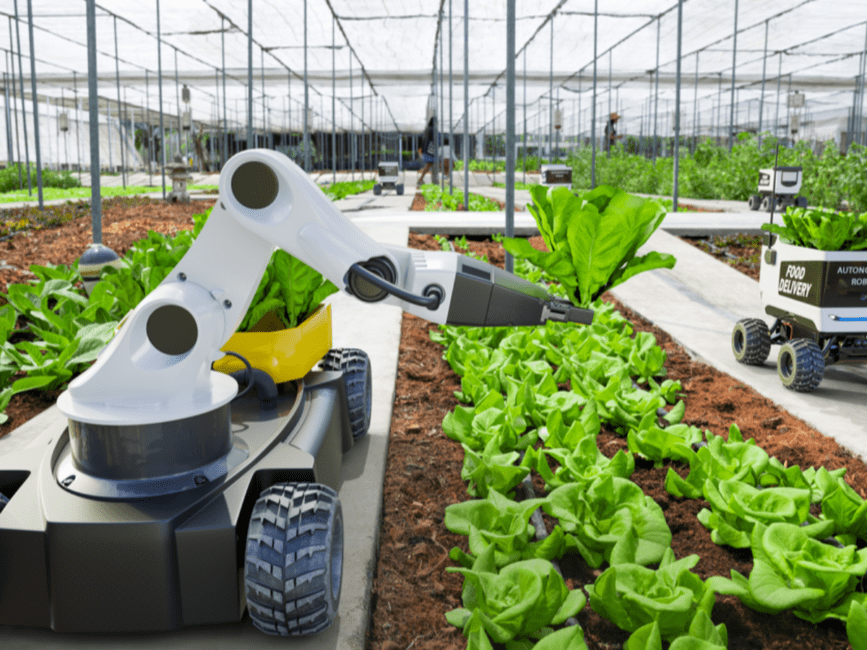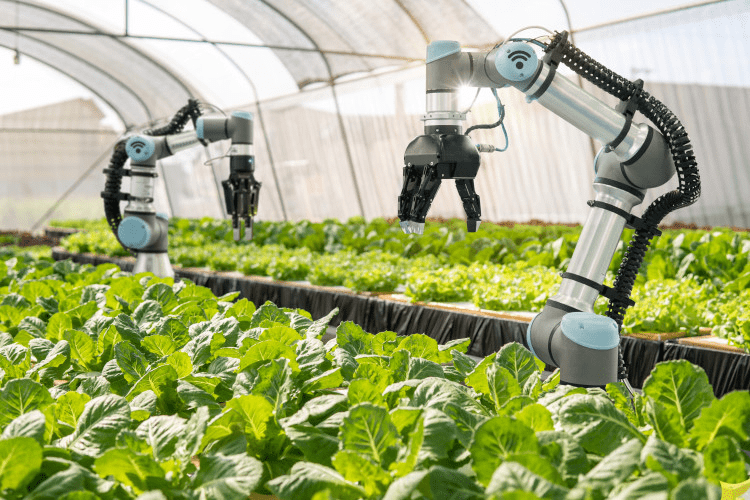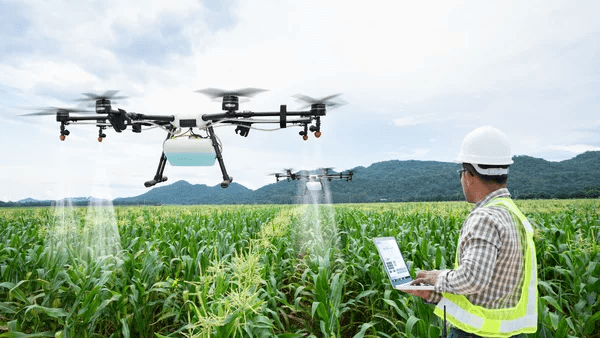In the dynamic realm of modern agriculture, the integration of innovative technologies has propelled the concept of farm automation into the spotlight. The evolution of farm automation systems has revolutionized traditional farming practices, heralding a new era of efficiency, precision, and sustainability.
Farm automation is already a major part of the farming process, but it will become even more important in the coming years. Farmers are already using drones to monitor their crops, and advanced sensors can tell them exactly when they need to water or fertilize their fields.
These devices can also be used to monitor soil quality and ensure that crops aren’t affected by drought or other environmental factors.
The increased level of automation will allow farmers to focus more on other aspects of their business than traditional manual labor tasks like watering, seeding, and harvesting.
As our world grapples with the challenges of a growing population and the need for sustainable food production, the role of technology in agriculture has become more pronounced than ever before.
Among the many advancements, farm automation stands out as a pivotal innovation that is reshaping the landscape of modern agriculture. By integrating cutting-edge technologies and intelligent systems, farm automation has the potential to enhance productivity, efficiency, and sustainability in the agricultural sector.
What is farm automation? Farm automation, in simple terms, refers to the integration of various technologies and systems in agricultural practices to automate tasks that were traditionally performed manually.
These technologies include but are not limited to robotics, sensors, drones, artificial intelligence, and data analytics. The primary goal of farm automation is to streamline operations, reduce labor dependency, optimize resource utilization, and ultimately increase overall agricultural output.
Farm automation systems entail the utilization of advanced technologies such as robotics, smart sensors, and data analytics to streamline various agricultural processes.
This integration of intelligent systems aims to optimize productivity, reduce operational costs, and ensure sustainable resource management.
By automating tasks that were once reliant on manual labor, farmers can now allocate their time and efforts more efficiently, leading to improved output and better overall farm management.
Read Also: How to Use Rice Husk to Produce Electricity
Dairy Farm Automation: A Paradigm Shift in Milk Production
The advent of dairy farm automation has fundamentally transformed the landscape of milk production. Automated milking systems, for instance, have not only alleviated the physical strain on dairy farmers but have also enhanced milk quality and quantity.
These systems employ sophisticated sensors to identify cows, monitor their health, and automate the milking process, ensuring consistent milk production while maintaining the well-being of the livestock.
The integration of farm automation technology in dairy farms has thus optimized production efficiency and elevated animal welfare standards.
Advancements in Farm Automation Technology: Enabling Precision Agriculture

Farm automation technology has paved the way for precision agriculture, a practice that emphasizes the precise management of resources based on real-time data and analytics.
Smart sensor technologies, embedded within the soil, enable farmers to monitor vital parameters such as soil moisture, temperature, and nutrient levels.
This data, when coupled with farm automation systems, empowers farmers to make informed decisions regarding irrigation schedules, fertilization requirements, and crop management strategies, resulting in optimized resource utilization and improved crop yields.
Read Also: 18 Medicinal Health Benefits Of Symphyotrichum divaricatum (White Wood Aster)
Embracing Sustainable Practices through Farm Automation
The integration of sustainable practices within farm automation systems has become increasingly crucial in ensuring the longevity of agricultural operations.
By leveraging renewable energy sources, such as solar-powered sensors and automated equipment, farmers can reduce their reliance on traditional energy grids, thereby minimizing their carbon footprint.
Furthermore, the implementation of precision farming techniques through farm automation can significantly reduce the use of water, fertilizers, and pesticides, promoting environmental sustainability and biodiversity preservation.
Robotic Applications in Agriculture

Robots have emerged as one of the key components of farm automation, offering a range of applications that contribute to enhanced productivity and precision.
For instance, autonomous robotic harvesters equipped with computer vision systems can identify and selectively pick ripe crops, reducing harvest time and minimizing wastage.
Similarly, robotic milking systems have revolutionized dairy farming by automating the milking process, ensuring consistent quality and minimizing the physical strain on farm workers.
Smart Sensor Technologies for Precision Agriculture
The integration of smart sensors has enabled farmers to collect real-time data on crucial parameters such as soil moisture, temperature, and nutrient levels.
This data, when analyzed using advanced algorithms, facilitates precise decision-making regarding irrigation, fertilization, and crop management.
Through the implementation of sensor-based systems, farmers can optimize resource allocation, minimize water usage, and reduce the environmental impact of farming practices.
Role of Drones in Farm Management

Drones have proven to be valuable assets in farm automation, offering rapid and comprehensive field monitoring capabilities.
Equipped with high-resolution cameras and multispectral sensors, drones can provide detailed aerial imagery, enabling farmers to assess crop health, detect pest infestations, and identify areas that require immediate attention.
By swiftly identifying potential issues, farmers can take proactive measures to mitigate crop damage and improve overall yield.
Read Also: Fattening of Sheep and Goats Guide
Utilizing Artificial Intelligence for Decision Support
The integration of artificial intelligence (AI) in farm automation has empowered farmers to make data-driven decisions with greater accuracy and efficiency.
AI algorithms can analyze large datasets to provide valuable insights into crop growth patterns, market trends, and weather forecasts.
This information enables farmers to optimize planting schedules, adjust cultivation practices, and make informed choices about crop selection, thereby maximizing profitability and minimizing risks.
Several notable examples around the world demonstrate the transformative impact of farm automation.
For instance, the use of automated vertical farming systems in urban environments has enabled year-round production of high-quality crops, reducing the reliance on traditional farmland and minimizing transportation costs.
Additionally, large-scale farms incorporating autonomous tractors and equipment have significantly enhanced operational efficiency, leading to increased productivity and reduced labor costs.
Across the globe, numerous examples underscore the transformative impact of farm automation.
For instance, the deployment of automated planting and harvesting systems in large-scale crop cultivation has led to significant improvements in operational efficiency, reducing labor costs and increasing overall productivity.
Additionally, the adoption of precision irrigation systems, controlled by intelligent sensors and automated algorithms, has enabled farmers to conserve water resources while maximizing crop yields, exemplifying the sustainability benefits of farm automation technology.
In summary, farm automation represents a fundamental shift in agricultural practices, offering a pathway to sustainable and efficient food production.
By harnessing the power of robotics, smart sensors, drones, and artificial intelligence, farmers can overcome traditional limitations and cultivate crops with greater precision and resource optimization.
Embracing farm automation not only enhances productivity but also promotes environmental sustainability, thereby paving the way for a more resilient and secure global food supply chain.
As we look ahead, continued research and innovation in farm automation hold the key to addressing the evolving challenges of food security and sustainability in the 21st century.
The integration of farm automation systems and technologies represents a pivotal step towards sustainable and efficient agricultural practices.
From dairy farms to crop fields, the application of automated systems has redefined the parameters of productivity, resource management, and sustainability.
As we continue to embrace the possibilities offered by farm automation, it is imperative to recognize its transformative potential in fostering a more resilient and sustainable agricultural ecosystem, thereby ensuring a secure and bountiful food supply for generations to come.
Read Also: Banana Tree Care: What You Need to Know
